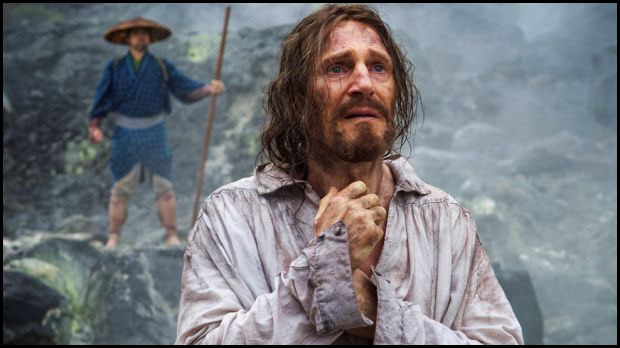Silence
Silence is a wonderful movie, on one level ... and tedious and boring on another. Achingly beautiful ... the cinematography is stunning, so are the landscapes and especially the settings in medieval Japan.

But the movie is too long by about half an hour. Some hundred minutes are used to set up the story, for an hour and a half we are given a picture of the persecution of Christians in seventeenth century Japan, replete with graphic scenes of torture and murder. All this could have been told in under an hour, because when we come to the juicy bits, the conversations between the young Padre Rodrigues and the elder Father Ferreira, I was exhausted and annoyed the story took that long to get here.
By then we had learned that the Christian faith is a torturous undertaking. If you pray to God, if you hope for a sign, a tangible response to your torment, you will be met with Silence. The film will instill in believers a sense of dread (I only can imagine, of course, being a non-believer myself). Because their faith doesn’t make life easy in the context of rational discourse as to whether their God exists or not.
For the non-believer the exercise is torturous too … myself, I find it incomprehensible that intelligent people (Jesuits priests apparently are well educated) submit to the notion that, if Jesus Christ was sacrificed for the sins of humanity, they have to repeat the sacrifice and take on the guilt of the Japanese for performing the most atrocious acts of barbarity on Christians. An Inquisition - Inquisition I had thought was rather much a European thing - was well and alive in medieval Japan, and just as efficient in its cruelty.
The film is at its best when it describes the Japan of that era. Absolutely stunning set pieces, wonderful costumes and incredibly well drawn characters; the acting is amazing throughout. The very best bits, as I said before, were the talks between the young Jesuit and the elder; as well as the set pieces in medieval Japan. On this level Scorsese's achievement is towering; it would, however, have been better were it more concise.
SPOLIER ALERT
Fr. Ferreira relays to Rodrigues how he has apostatized and converted to Buddhism. He explains how the Japanese just simply don’t get Christianity … the concept of the Father and His Son who got killed and arose from the dead after three days, is mis-read: We worship the sun too, they’ll say, but it arises every day! Wonderful.
Buddhism, with its nativism, is given a great plug here. At one stage a Buddhist monks recites that great Zen koan:
You can move mountains,
you can move rivers,
but you can’t change a man’s mind
And that indeed is the truth with faith; if you're stuck in faith ... you're stuck for good. For me, as a person not of faith - I had written before in a blog (760) I hoped the movie would clarify the issue of faith for me - it confirms my understanding of it:
Faith is irrational, delusional, destructive and counterproductive. And what is this confession nonsense? You go to your priest ... you confess your sins ... you are told they are forgiven ... and then you go and repeat them all over? Insanity.
Faith increases suffering; an inevitable, intrinsic aspect of faith is doubt ... incomprehensibly painful, torturous doubt; see my previous blog 794.
Buddhism is designed to diminish suffering. I take Buddhism anytime ...
__________________________________________________________________
... I take Buddhism anytime, over Christianity. And the thing about worshipping the sun, what a great idea ... George Carlin went there himself. I had a reader - G'day Bob Martin (blog 388) - mention George and I re-visited his rant on religion. His idea of worshipping the sun makes so much sense (donno about worshipping Joe Pesci, though). Enjoy.